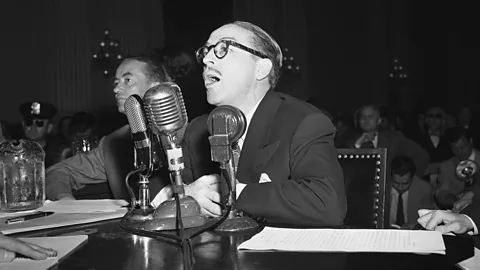'I went spectacularly broke': The blacklisted Hollywood writer who won two Oscars
 Getty Images
Getty ImagesOn 22 June 1950, the notorious Red Channels pamphlet was published, implicating some of Hollywood's biggest stars as communists. As part of the "Red Scare" that followed, Dalton Trumbo – who went on to write Roman Holiday and Spartacus – was accused of spreading subversive ideas through his films, and imprisoned. In 1960, he told the BBC about his experiences.
When the BBC interviewed screenwriter Dalton Trumbo beside his Hollywood swimming pool in 1960, he had just written the scripts for two of the year's biggest movies. Despite this runaway success, interviewer Robert Robinson observed in him a "certain reticence", guessing that he had "no wish to revive old feuds". It was no wonder he felt a little bruised.
Jailed, blacklisted by Hollywood and forced to work in secret under a series of fake names, Trumbo had spent the past 13 years being battered by the US anti-communist witch hunt. All he had done was refuse to tell a US government committee in 1947 if he was a communist, as he felt under the First Amendment he had the legal right to hold any political views he wanted.
Of course, Trumbo had been a member of the Communist Party but that wasn't the point, and in any case, he was far from a stereotypical "Red". He later told the BBC: "I never felt the slightest guilt about making what I earned – the pictures were making millions. If I got a small part, fine, I enjoyed it. The idea of guilt, I'm not puritanical, would have startled me."
Born in 1905, Trumbo's writing career took off in the 1930s and by the end of the decade, he was one of Hollywood's highest-paid screenwriters. In that era, Hollywood was isolated from the worst of the Great Depression thanks to its popular and lucrative escapism in a troubled world, but a strong social conscience was stirring among some in the entertainment industry.
Trumbo later told the BBC in 1973: "People ed the Communist Party because it was doing things that they felt should be done. It was opposing the rise of fascism all through Europe. It was helping those who were refugees."
Subversion through cinema
The House Committee on Un-American Activities (HUAC), which later became notorious for its scrutiny of the film industry, was formed in 1938 to investigate "subversive" tendencies such as communist links.
However, with the advent of World War Two, shifting allegiances made for strange bedfellows. Adolf Hitler and Nazi 's invasion of the Soviet Union in 1941 meant that Stalin's communist Russia was suddenly an ally of the US.
Hollywood did its bit for the war effort with a few pro-Soviet films such as 1943 curio Mission to Moscow. Its director, Michael Curtiz, had won the best director Oscar a year earlier for Casablanca.
But when the war ended, the US and the Soviet Union's uneasy alliance crumbled, ushering in a new era of Cold War paranoia. This worry about the perceived threat of communism was the perfect environment for HUAC to expand its influence.
In 1947, Trumbo was one of 10 Hollywood writers and directors put on the stand during its hearings on alleged communist propaganda in the movie business. One question was repeatedly asked of them: "Are you now, or have you ever been, a member of the Communist Party">window._taboola = window._taboola || []; _taboola.push({ mode: 'alternating-thumbnails-a', container: 'taboola-below-article', placement: 'Below Article', target_type: 'mix' });
